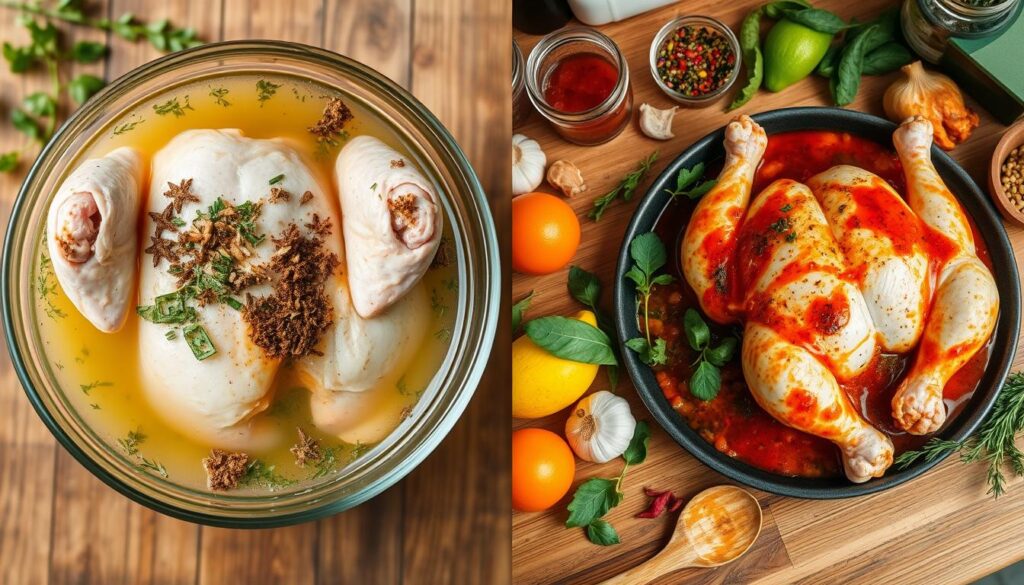Brining is a game-changer for juicy chicken. It uses salt and water to keep moisture in and boost flavor. This simple recipe is quick and easy, turning ordinary chicken into a tasty meal. It’s great for meal prep or impressing guests.
Table of Contents
What is Brining?
Brining is a simple yet effective technique that turns ordinary chicken breasts into juicy, flavorful masterpieces. It involves soaking the chicken in a saltwater solution, called a brine. The salt in the brine breaks down the chicken’s protein structures, allowing it to absorb and retain more moisture.
As a result, the chicken becomes incredibly moist, tender, and bursting with flavor.
Understanding the Brining Process
The science behind brining is quite fascinating. The salt in the brine is key, as it helps to denature the proteins in the chicken. This disruption of the protein structure allows the meat to hold on to more moisture during cooking, preventing it from drying out.
Additionally, the brine infuses the chicken with savory, seasoned flavors that permeate the meat from the inside out.
Benefits of Brining Chicken Breasts
- Improved moisture retention, keeping the chicken juicy and tender even if slightly overcooked
- Enhanced overall flavor by infusing the chicken with salt and any added seasonings
- Tenderized meat due to the salt’s ability to break down connective tissue
By understanding the chicken brining process and its many benefits, you’ll be well on your way to achieving perfectly moist, juicy, and tender chicken breasts every time.
The 4 Must-Have Ingredients for a Perfect simple chicken brine
To get juicy, flavorful chicken, start with the right brine. You need just four key ingredients: salt, sugar, aromatics, and water. These mix together to make chicken breasts tender and moist.
Salt is crucial for the brine. It breaks down chicken proteins, making the meat absorb more moisture. Use about 2 tablespoons of kosher salt per liter of water for a 3% salt solution.
Sugar adds sweetness and tenderness. Even though it’s not essential, a bit of sugar (about 1 tablespoon per liter) can improve the taste.
- Aromatics, like herbs, spices, and citrus, add extra flavor. You can use dried star anise, cinnamon sticks, allspice berries, black peppercorns, bay leaves, sage, thyme, rosemary, garlic, lemon, and orange.
- Lastly, water is the base. It dissolves the other ingredients and fully covers the chicken.
| Ingredient | Recommended Ratio | Purpose |
|---|---|---|
| Kosher Salt | 2 tbsp per liter of water | Helps break down proteins and aids moisture absorption |
| Sugar | 1 tbsp per liter of water | Adds sweetness and tenderness |
| Aromatics | Variety of herbs, spices, and citrus | Infuses the brine with additional flavors |
| Water | As needed to fully submerge the chicken | Provides the medium for the brine solution |
By mixing these four, you get a simple yet effective chicken brine. It turns regular chicken breasts into juicy, tasty dishes. Find out the best chicken brine ratio and enhance your simple chicken brine recipe.
Step-by-Step Guide to Brining Chicken Breasts
Brining chicken breasts makes them juicy and flavorful. Here’s how to do it right:
Gather the Necessary Ingredients
You’ll need a few things to brine chicken:
- Water
- Kosher salt or pink Himalayan salt
- Sugar
- Optional aromatics like garlic, herbs, spices, or citrus
Prepare the Brine
The right salt-to-water ratio is key. Use 3 cups of water and 2 tablespoons of kosher salt or 1 tablespoon of pink Himalayan salt. Dissolve the salt in 1 cup of warm water, then add 2 cups of cold water. You can also add ice cubes to cool it faster.
Adding aromatics like a bay leaf or fresh herbs can enhance flavor. Just remove them before adding the chicken.
Brine the Chicken Breasts
Put the chicken breasts in a bowl or container. Make sure they’re fully covered. Cover the bowl and refrigerate for 40 minutes to 1 hour. This lets the salt work without over-brining.
Rinse and Pat Dry
After brining, rinse the chicken under cold water. Pat it dry with paper towels. This removes excess moisture and helps seasonings stick better.
Rest and Cook
Let the brined chicken rest at room temperature for 10-15 minutes. This redistributes juices, making each bite moist and flavorful. Now, you can cook it by baking, grilling, or sautéing.
Brining vs. Marinating: What’s the Difference?
Preparing juicy and flavorful chicken often involves brining or marinating. Both methods can make the meat taste better and feel softer. But they work in different ways.
Brining means soaking the chicken in saltwater. This keeps the meat moist and tender. The salt gets deep into the chicken, making it taste better all over.
Marinating is about soaking the chicken in a mix of oil, vinegar, and spices. It adds flavor to the outside but doesn’t change the meat’s moisture or texture much.
| Brining | Marinating |
|---|---|
| Helps the chicken retain moisture and become more tender | Adds surface-level flavor without affecting moisture or texture |
| Requires a saltwater solution | Involves a flavorful liquid mixture (oil, vinegar, spices) |
| Allows the salt to penetrate deep into the chicken | Primarily adds flavor to the exterior of the chicken |
In short, brining vs. marinating chicken is about different goals. Brining makes the meat juicy and tender. Marinating adds flavor to the outside. Your choice depends on what you want and like best.

“Brining is the best way to ensure your chicken breasts stay juicy and flavorful, while marinating is ideal for adding a specific flavor profile to the meat.”
chicken breast brine Variations and Flavors
A simple salt-and-water brine can do wonders. But, you can also add spices and herbs to make your flavored chicken brine unique. These ingredients can turn your chicken breasts into something truly special.
Herbs and Spices for Extra Zing
Fresh rosemary, thyme, or sage can add an earthy flavor. Crushed garlic cloves give a savory kick. Whole peppercorns or crushed red pepper flakes add a bit of heat.
Fennel seeds or star anise bring a subtle licorice taste. Lemon or orange zest brighten the flavor.
For a custom flavored chicken brine, mix different spices and herbs. You can make the chicken brine recipe ideas your own. The choices are endless.
“Brining chicken breasts adds moisture and tenderness, while also allowing you to infuse them with delicious flavors.”
It’s important to find the right mix of flavors in your chicken brine. You want a balance of savory, sweet, and aromatic. This way, the flavors will complement the chicken’s natural taste.
Storage and Food Safety Tips
Proper storage and food safety are key for brined chicken. To keep your brined chicken breasts fresh and tasty, follow these tips:
Refrigeration and Freezing
Store your brined chicken breasts in the fridge at 40°F (4°C) or below for 3-4 days. For longer storage, freeze it for 9-12 months at 0°F (-18°C) or below. Use airtight containers or heavy-duty freezer bags to keep it fresh and prevent freezer burn.
Safe Handling
Always follow food safety when handling brined chicken. Wash your hands with soap and water before and after touching the chicken. Use separate cutting boards and utensils to avoid cross-contamination. Cook the chicken to 165°F (74°C) to ensure it’s safe to eat. Thaw frozen chicken in the fridge, not at room temperature.
Shelf Life and Food Safety
Brined chicken lasts longer than unbrined chicken, but watch for spoilage signs. Look for off odors, sliminess, or color changes. If unsure, it’s safer to throw it away. Properly stored, brined chicken can last 3-4 days in the fridge or 9-12 months in the freezer.

Enjoying your brined chicken’s juicy and flavorful taste depends on food safety. By following these simple steps, you can keep your brined chicken fresh and safe to eat.
Recipes to Try with Perfectly Brined Chicken Breasts
Now that you’ve mastered brining chicken breasts, it’s time to try new recipes. Brined chicken breasts are great for many flavors. You can make classic dishes or try something new.
Grilled Brined Chicken Breasts
Grilling brings out the best in brined chicken breasts. Season the chicken with your favorite herbs and spices. Grill over medium-high heat for 10 minutes per side, until it reaches 165°F.
Baked Brined Chicken Breasts
Baking is a simple way to enjoy brined chicken breasts. Preheat your oven to 450°F. Bake the chicken for 15-18 minutes, depending on size. Let it rest for 5-10 minutes before serving.
Brined Chicken Salad
Chop brined chicken and add it to a fresh salad. It’s a quick and tasty meal. The chicken goes well with greens, veggies, and your favorite dressing.
Brined Chicken Wraps
Shred or slice brined chicken breasts for wraps. Add veggies, cheese, and a creamy dressing. It’s a delicious and easy lunch.
Don’t rinse the chicken after brining. This keeps the seasoning and juiciness in. Enjoy using perfectly brined chicken in your meals!
Conclusion
Brining is a simple yet powerful technique that makes chicken breasts juicy and flavorful. By following the right steps and using the essential ingredients, you can make perfectly brined chicken. It’s moist, tender, and full of taste. Brined chicken breasts are great for grilling, baking, or sautéing.
The benefits of brining chicken are many. It keeps the chicken moist, preventing it from becoming dry. This makes the final product more succulent and flavorful. You can also adjust the brine to suit your taste by adding herbs and spices.
Brining chicken breasts is a skill that can change your cooking game. It’s perfect for both seasoned cooks and beginners. With the right techniques and focus on food safety, you’ll always have juicy, tender, and flavorful chicken. Try brining to take your chicken dishes to the next level.

